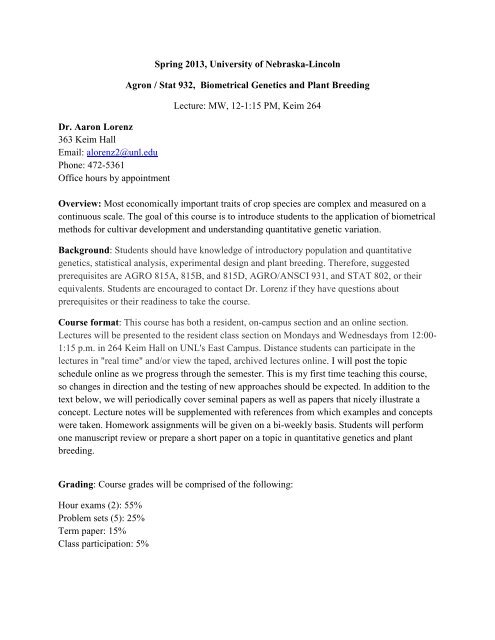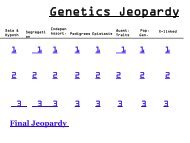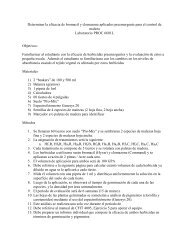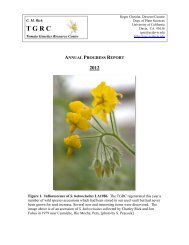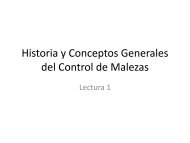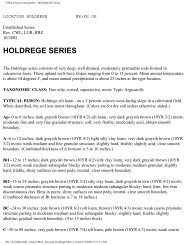Agron 932 syllabus and schedule Spring 2013.pdf
Agron 932 syllabus and schedule Spring 2013.pdf
Agron 932 syllabus and schedule Spring 2013.pdf
You also want an ePaper? Increase the reach of your titles
YUMPU automatically turns print PDFs into web optimized ePapers that Google loves.
Dr. Aaron Lorenz<br />
363 Keim Hall<br />
Email: alorenz2@unl.edu<br />
Phone: 472-5361<br />
Office hours by appointment<br />
<strong>Spring</strong> 2013, University of Nebraska-Lincoln<br />
<strong>Agron</strong> / Stat <strong>932</strong>, Biometrical Genetics <strong>and</strong> Plant Breeding<br />
Lecture: MW, 12-1:15 PM, Keim 264<br />
Overview: Most economically important traits of crop species are complex <strong>and</strong> measured on a<br />
continuous scale. The goal of this course is to introduce students to the application of biometrical<br />
methods for cultivar development <strong>and</strong> underst<strong>and</strong>ing quantitative genetic variation.<br />
Background: Students should have knowledge of introductory population <strong>and</strong> quantitative<br />
genetics, statistical analysis, experimental design <strong>and</strong> plant breeding. Therefore, suggested<br />
prerequisites are AGRO 815A, 815B, <strong>and</strong> 815D, AGRO/ANSCI 931, <strong>and</strong> STAT 802, or their<br />
equivalents. Students are encouraged to contact Dr. Lorenz if they have questions about<br />
prerequisites or their readiness to take the course.<br />
Course format: This course has both a resident, on-campus section <strong>and</strong> an online section.<br />
Lectures will be presented to the resident class section on Mondays <strong>and</strong> Wednesdays from 12:00-<br />
1:15 p.m. in 264 Keim Hall on UNL's East Campus. Distance students can participate in the<br />
lectures in "real time" <strong>and</strong>/or view the taped, archived lectures online. I will post the topic<br />
<strong>schedule</strong> online as we progress through the semester. This is my first time teaching this course,<br />
so changes in direction <strong>and</strong> the testing of new approaches should be expected. In addition to the<br />
text below, we will periodically cover seminal papers as well as papers that nicely illustrate a<br />
concept. Lecture notes will be supplemented with references from which examples <strong>and</strong> concepts<br />
were taken. Homework assignments will be given on a bi-weekly basis. Students will perform<br />
one manuscript review or prepare a short paper on a topic in quantitative genetics <strong>and</strong> plant<br />
breeding.<br />
Grading: Course grades will be comprised of the following:<br />
Hour exams (2): 55%<br />
Problem sets (5): 25%<br />
Term paper: 15%<br />
Class participation: 5%
Exams: There will be three exams, including the final. Exams will emphasize interpretation of<br />
theory <strong>and</strong> analysis of problems. Exams may be given during the lecture period, or be take-home<br />
exams. A tentative exam <strong>schedule</strong> is given below.<br />
Class Participation: Biometrical genetics can be learned only through study <strong>and</strong> practice at<br />
problem solving. Class attendance <strong>and</strong> participation during class are important to good<br />
underst<strong>and</strong>ing of the material. At the end of the semester the instructor will give scores each<br />
student for class participation.<br />
Important dates: Midterm exam -- March 13<br />
Term paper deadline – Apr 24<br />
Final exam – May 1, 3:30 – 5:30<br />
Academic honesty: The following from the UNL-CSE website nicely sums up the st<strong>and</strong>ard of<br />
academic honesty held in this course:<br />
• Taking full credit for your own work, <strong>and</strong> giving full credit to others who have helped<br />
you, or whose work you have incorporated into your own.<br />
• Representing your own work honestly <strong>and</strong> accurately.<br />
• Cooperating with other students on academic exercises only where specifically<br />
authorized.<br />
Any students found violating academic honesty policies will be automatically given an F <strong>and</strong><br />
reported to the department chair to determine what further punitive action is necessary.<br />
Content: Following an overview <strong>and</strong> review of basic mathematical properties important in<br />
biometrical genetics, three main subjects will be covered (listed with tentative sub-topics):<br />
1. Estimation of genetic value<br />
a. Linear models for effect estimation<br />
b. Mixed models for multi-environment trials<br />
c. Best linear unbiased prediction<br />
2. Selection theory<br />
a. Breeder’s equation<br />
b. Decomposition of genetic variation<br />
c. Heritability<br />
d. Recurrent selection<br />
e. Probability of identifying superior individuals in pedigree breeding<br />
f. Indirect selection<br />
i. Selection using family information<br />
ii. Selection for multiple traits<br />
3. Genetic architecture <strong>and</strong> incorporation of markers into breeding programs
a. Use of markers to quantify genetic variation <strong>and</strong> study population/family<br />
structure<br />
b. QTL mapping<br />
c. Marker-assisted selection<br />
d. Genomic selection<br />
Text: There is not a required text. I will derive notes from two important texts that would be<br />
valuable in any plant breeder’s book collection<br />
• Bernardo, R. 2010. Breeding for quantitative traits in plants. 2 nd Ed. Stemma Press.<br />
• Lynch, M. <strong>and</strong> B. Walsh. 1998. Vol. 1: Genetics <strong>and</strong> analysis of quantitative traits.<br />
Sinauer, MA<br />
Additionally, Bruce Walsh’s website contains a virtual online textbook. This is free of charge<br />
until he officially publishes it:<br />
http://nitro.biosci.arizona.edu/zbook/NewVolume_2/newvol2.html<br />
Other references will consist of primary research articles <strong>and</strong> review articles which will be<br />
provided to students as the course progresses.<br />
Noncredit students: Students not taking this course for academic credit will be responsible for<br />
the midterm exam <strong>and</strong> final exam. Notes <strong>and</strong> texts will be allowed on tests for noncredit<br />
students.


